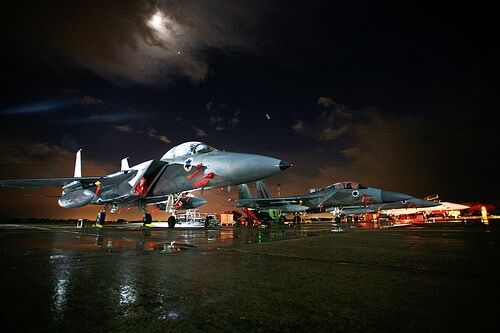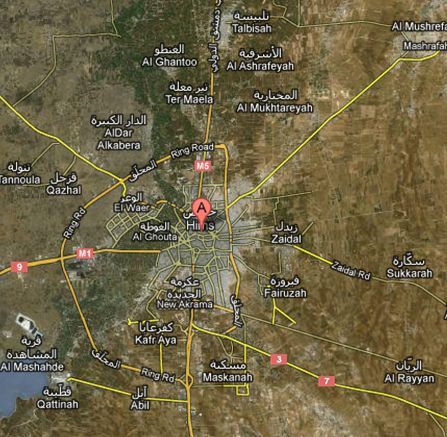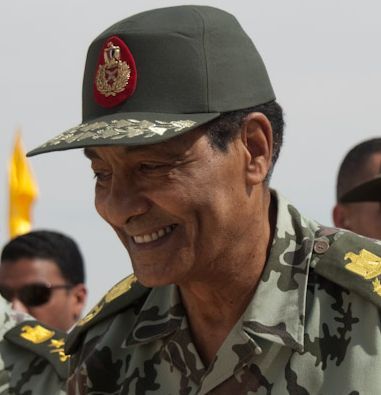 Everything you need to know about the weekend coverage of Israel and the Mideast.
Everything you need to know about the weekend coverage of Israel and the Mideast.
Blood flows in Homs while the UN remains deadlocked, Hezbollah shells Free Syrian Army positions, and US officials don’t seem to know if/when Israel will strike Iran.
Join the Media Cheat Sheet Page on Facebook.
Iranian Atomic Urgency
• Quote of the Day goes to Iran’s supreme leader, Ayatollah Ali Khamenei:
“From now onward, we will support and help any nations, any groups fighting against the Zionist regime across the world, and we are not afraid of declaring this,” Khamenei said during a rare Friday prayer lecture at Tehran University.
• ABC News obtained an Israeli security document warning that Israeli and Jewish sites in the US could be targeted by Iran:
“We predict that the threat on our sites around the world will increase . . . on both our guarded sites and ‘soft’ sites,” stated a letter circulated by the head of security for the Consul General for the Mid-Atlantic States. Guarded sites refers to government facilities like embassies and consulates, while ‘soft sites’ means Jewish synagogues, and schools, as well as community centers like the one hit by a terrorist bombing in Buenos Aires in 1994 that killed 85 people . . . .
Federal officials in those cities told ABC News that they have also increased their efforts to watch for any threat stream pointing to an imminent attack on either Israeli facilities, Jewish cultural or religious institutions or other “soft targets.”
![]()
• Leon Panetta believes Israel will attack Iran in the spring. Washington Post columnist David Ignatius explains why:
Panetta believes there is strong likelihood that Israel will strike Iran in April, May or June — before Iran enters what Israelis described as a “zone of immunity” to commence building a nuclear bomb. Very soon, the Israelis fear, the Iranians will have enough enriched uranium in deep underground facilities to make a weapon — and only the U.S. could then stop them militarily.
Israeli Prime Minister Benjamin Netanyahu doesn’t want to leave the fate of Israel dependent on American action, which would be triggered by intelligence that Iran is building a bomb, which it hasn’t done yet.
 • A NY Times staff-ed comes out squarely against an Israeli strike on Iran:
• A NY Times staff-ed comes out squarely against an Israeli strike on Iran:
Washington still believes there is “time and space” for sanctions to work. But there is a frightening scenario going around Washington and several European capitals that Prime Minister Benjamin Netanyahu of Israel may attack Iran before the summer — believing that President Obama will not try to stop him in the middle of a re-election campaign.
Israel must defend itself. This country’s alliance with Israel is crucial. We hope for everyone’s sake that Israel’s leaders weigh all of the consequences before they act. A military attack would almost certainly make things worse. Tough sanctions and a united diplomatic front are the best chance for crippling Iran’s nuclear program.
A Sydney Morning Herald staff-ed and Philadelphia Inquirer columnist Trudy Rubin concur, but a NY Daily News staff-ed agrees with Ehud Barak that “Later is too late.”
• Robert Fisk‘s pearls of wisdom:
Now I don’t doubt that within seconds of hearing the news, Barack Obama’s grotesque speech-writers will be grovelling to find the right words to support such an Israeli attack. If Obama can abandon Palestinian freedom and statehood for his own re-election, he can certainly support Israeli aggression in the hope that this will get him back in the White House.
Israel and the Palestinians
• A French activist was hit by an IDF tear gas cannister during a Nabi Saleh demonstration. The incident was caught on video and the army’s investigating. More at Haaretz.
• Sydney Morning Herald correspondent Ruth Pollard blames the settlements for deep-sixing Amman’s efforts to move Israelis and Palestinians back to the negotiating table. So what went wrong? I can’t decide whether to blame Saeb Erekat or the Green Bay Packers.
• As the the BDS conference at the U. of Pennsylvania gets underway, Stu Bykofsky (Philadelphia Inquirer) heaps scorn on the event.
Arab Spring Winter
• Security Council deadlock on Syria continues as Russia and China veto a Western-backed condemnation. As far as Israel’s concerned, this reaffirms that the UN’s incapable of handling war and peace.

• Out of Step Watch: Last September, the NY Times said Israel and the US would be international pariahs for defying the rest of the world on Palestinian statehood. My how times have changed.
Now without drawing any moral equivalence, get a load of this headline in The Indpedendent and judge for yourself whether the NYT’s previous criticisms will now be applied to Russia and China . . .

• Melanie Phillips goes a step further, saying the time has come to delegitimize the UN.
• So why do Russia and China continue to support Assad? In a nutshell, CNN says, “Money talks.”
Russia is one of Syria’s biggest arms suppliers. And China ranked as Syria’s third-largest importer in 2010, according to data from the European Commission.
• The Free Syrian Army tells Michael Weiss (Daily Telegraph) that Hezbollah’s been firing Katyushas from Lebanon at their positions.
“Hezbollah received information that the Iranians who were captured in Homs had been taken to north Syria,” he told me. “So Hezbollah started bombing us there with Katyushas. They fired around 21 rockets from near Al-Hermel in Lebanon, which is close to the Syrian border.”
• As for the weekend massacre in Homs, see Time.
Various activist groups offered differing figures, but somewhere between 217 to perhaps as many as 337 people were killed in Syria’s third-largest city in a barrage of mortar-fire and artillery. More than 1,000 were injured.

• Over at the Washington Post, Thomas Carothers wants to see idealism return to Washington’s handling of the Arab Autocrats and the People Who Resist Them.
The Post also reports that the Egyptian junta’s crackdown on pro-democracy groups imperils US aid, but according to The Media Line, the generals are confident the US will blink first over its six citizens in custody:
“We no longer have to worry about Washington because we have the power,” a military source close to the Supreme Council of the Armed Forces (SCAF), the cadre of generals now ruling the country, told The Media Line. The U.S. needs the military more than the Egyptian military needs Washington, he confidently declared.

• Sinai saboteurs blew up Egypt’s gas pipeline to Israel yet again.
Rest O’ the Roundup
• Haaretz columnist Chemi Shalev makes a compelling case that Western media’s disproportionate coverage fixation with Israel is actually good. See my response.
• Worth reading: Israel’s Love-Hate Relationship With the UN
• Fauxtography ain’t just in the Mideast. The Sacramento Bee canned its photo editor over three images he digitally altered.
• FYI, the NY Times released its latest paywall stats. Newsonomics (via Columbia Journalism Review) crunched the numbers. Some key points:
- 390,000 digital subscribers overall
- Growth rate of 20 percent, fourth quarter over third quarter
- 12 percent of the digital customers live outside the US.
Newsonomics estimates that the paywall produced approximately $86 million in 2011, or roughly 12 percent of the paper’s overall circulation revenue for the year.
(Image of jets via Flickr/Israel Defense Forces, Tantawi via US Army/Staff Sgt. Helen Searcy)
For more, see Thursday’s Media Cheat Sheet.

